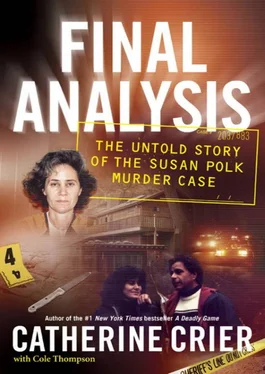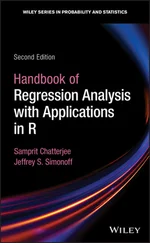“You are everything to me,” Eli wrote in one letter to his mother. “I will be there for you for the rest of your life. You are the strongest, smartest and most loving person I know. I will always be proud to have you as my mom. Most importantly, don’t ever forget, or force out, the perfect person you are. Never again will I be as happy as I could with you in jail…. You dying is a part of me dead as well.”
Chapter Twenty
BUCKING AUTHORITY
Since her arrest on that October night, Susan was convinced that authorities had targeted her unfairly because of actions she took during her divorce proceedings with Felix. In her mind, the judges were part of a conspiracy and did not want to help her in any way.
“I believe the reason for this animosity is political,” Susan wrote in a letter she later sent to the court:
In October 2002, shortly before my husband’s death, I sent a letter containing an excerpt from my diary to 7 (seven) judges in Contra Costa County accusing Judge Kolin of taking a bribe in a juvenile case involving one of my sons. There were other political statements in my diary, excerpts, which may have given rise to prejudice. I believe Judge [Laurel] Brady received a copy of this letter.
Judge Kolin was called as a prosecution witness at a bail hearing in 2004. He is a friend of Bud McKenzie, my brother-in-law’s attorney, and so testified. Mr. McKenzie, according to Judge Kolin, asked him to help prevent me from getting bail. Judge Dan O’Malley essentially recused himself in October of 2004, stating he had been contacted by a number of De la Salle parents. The Briners, friends of Bud McKenzie with whom my son Gabriel lives, are De la Salle parents. Mr. McKenzie was a De la Salle parent. The O’Malleys are Carondolet parents, the sister school of De la Salle.
It seems apparent that there has been a great amount of discussion and influence among these parties, which has also prejudiced the bench. It should also be noted that De la Salle raised money for my sons following their father’s death. The Psychology teacher at De la Salle, Mr. Otterstadt, was a former patient and trainee of my husband. I am informed and believe it to be true that Mr. Otterstadt organized the De la Salle community in relation to my husband’s death and the case against me.
Susan went on to describe being “attacked” by an officer of the court in August 2003, the day she attempted to file a Faretta motion—a preliminary step to representing herself. The motion is based on a 1975 decision that permitted a defendant to represent himself in a California murder case.
“I was attacked by Deputy Carin, and my arm was broken by him. He hit my elbow with a ‘blackjack,’ a metal rod,” Susan wrote.
Susan went on to claim that the officer assigned to investigate the incident “appears to be related to Judge [Laurel] Brady’s clerk.”
“He refused to take my statement, angrily declaring: ‘I’m not taking anything from you,’ betraying prejudice and animosity,” Susan wrote.
“This beating is relevant to the homicide case in that I intend to show that the investigation was tainted, exculpatory evidence including my diary was destroyed by law enforcement officers. Other examples of tampering with evidence exist. The beating was an attempt to silence me. In fact, Deputy Carin said just before he broke my arm, ‘I told you not to speak in court,’ a major obstacle to a pro per defendant.”
Regardless of Susan’s conspiracy theories, these early bail hearings made it clear that her contempt for authority in the court of law was a much larger problem, one that would prove highly ineffective if carried into the trial. Any progress she made would be reduced when she lashed out at the judges and their subordinates. Her paranoia became increasingly harmful to her case when coupled with her adamant refusal to obey the will of the court. When faced with the choice between controlling herself and lashing out at the bench, she always chose the latter, ensuring that she received no respect from the judges that controlled her fate.
It was a risky path for anyone to take, but for a woman accused of first-degree murder, it appeared almost suicidal.
More than two years of arguing over Susan’s bail status (or lack thereof) did little to improve her situation. Finally, in the fall of 2004, Judge Mary Ann O’Malley conducted a review of Susan’s no-bail status. Prosecutor Tom O’Connor called Adam to the stand on September 10 to clarify a letter he wrote to the court with regard to bail for his mother, a letter which had ended with Adam saying that it was right for the court to release Susan.
“You know, I love my mom. She’s always known that,” Adam said to O’Connor. “I don’t think that she’s a person who belongs in prison. I don’t think she fits into the general public of a prison. However, that being said, I don’t think she belongs in the general public right now either.”
“And why is that, sir?”
“I think that my mom has psychological issues that need to be dealt with that could be detrimental to other people around her…and herself,” Adam said.
“Was it your opinion that prior to what occurred with your father that your mother was delusional?”
“A hundred percent, yeah. I told her every day.”
“Did those delusions focus on one individual?”
“No, I guess the focal point of her delusions was obviously my father. But there’s always something she’s been delusional about for as long as I can remember [that] my father was a double agent for the Israeli intelligence.”
This idea of Susan’s delusions was the focal point of O’Connor’s argument that she should not be allowed out on bail. Focusing on her delusions about Felix’s involvement with Israeli intelligence, her belief that the Briners were embezzling her money, and statements she made about the “Jewish Network,” O’Connor sought to portray Susan as a woman whose mental state was a risk to those around her.
On cross-examination, Susan’s public defender, Jack Funk, an associate of Peter Coleridge, designed his questioning of Adam to convey that Susan’s delusions had a singular focus on Felix. Susan’s delusional behavior did not make her a threat to the public at large, it made her a threat to Felix. Since he was no longer alive, Susan no longer posed a risk to the public.
“During your lifetime… do you know of any other time in which your mother has attacked or threatened any other person?”
“No.”
“And do you have any reason to believe that if your mother were released, upon whatever appropriate security, that she would threaten or attack any other person?”
“I believe the only answer I can give to that question is, I don’t know. I don’t think it’s a fair question to ask me because I don’t know what happened in the cottage that night…. My honest opinion on my mom is that she is an 80 percent sane and rational person and she’s 20 percent delusional, and that 20 percent is completely unpredictable. There’s no way for anybody to know what’s going to happen next, and that’s why I think she needs to be getting help somewhere…. She should not be in prison. She should be getting help somewhere so she can come out and be a fully functional member of society.”
Shortly after the hearing in September 2004, Judge O’Malley set bail for Susan at $1,050,000, but Susan’s time on the outside was brief. Within seven months of posting the monies, she was back behind bars at the West County Detention Facility for violating the terms of her release.
On October 6, 2004, Adam filed a “wrongful death civil suit” against Susan seeking $1 million dollars in damages in addition to other declaratory relief. Eli Polk and Felix’s twin brother, John, who was executor of the Polk estate, were named as codefendants in the suit. Andrew and Jennifer Polk declined to participate in the legal action, according to the court papers.
Читать дальше











